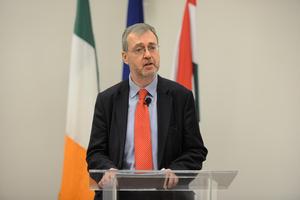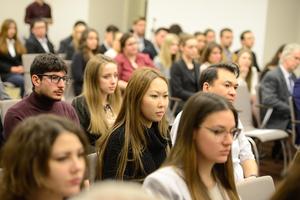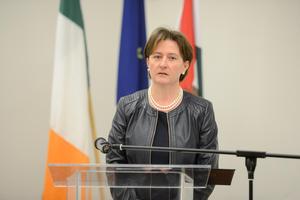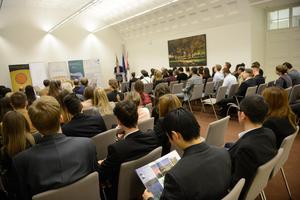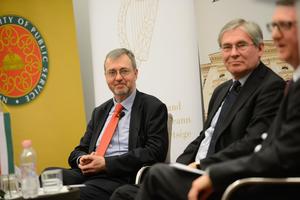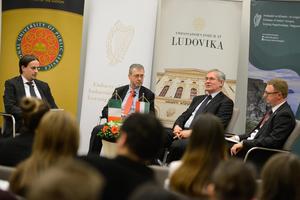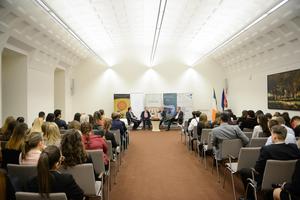H.E. Patrick Thomas Kelly, Ambassador of Ireland to Hungary, Kosovo and Montenegro was the special guest of the next Ambassadors’ Forum at Ludovika who held a presentation titled “Ireland, Hungary and the future of the EU”.
His Excellency is representing the Republic of Ireland in Hungary and in some regions of the Balkans since 2015. The ambassador graduated at the University College Dublin Master’s Degree, Political Science and Government then worked in the Department of Foreign Affairs and Trade, Ireland. Within the Department of Foreign Affairs and Trade, he was first director of the Africa Department, then director of the Middle East and North Africa Unit. During his professional career, he also worked as UN Director at Department of Foreign Affairs and Trade, Ireland.
The Ambassador’s Forum at Ludovika event, organised by the International Relations Office, was opened by Dr. habil. Györgyi Nyikos. The NUPS’ Vice-Rector for International Affairs accentuated in her opening speech that the Ambassador’s Forum at Ludovika is a very important event for the university. She explained that “the event, and especially the special guest is very popular amongst the students. It is a great opportunity for the university students to get an insight into the world of diplomacy and to get first-hand information about the most recent and important domestic matters and international challenges.”
At the beginning of his speech, His Excellency thanked the opportunity to present at this well-known event. He added that this is a great chance to strengthen the fruitful Irish-Hungarian relations. Beside presenting the bilateral Irish-Hungarian relations, the ambassador also talked about the situation of his country in the EU and about the challenges that are affecting all member states.
The ambassador first presented the historical background of his country from the beginning of the 20th century until 1973 when they joined the European Economic Community. Although they were not impacted by the WWII, their history during the last century was nearly as adventurous as Hungary’s. Similarily to us, at the turn of the century they were also still an integrated part of an empire. However, WWI brought significant changes in the life of the country; the intensifying voices of idependence culminated in the 1916 Easter Rising and eventually - through the War of Independence - led to the proclamation of the Republic of Ireland. The Easter Rising was surpressed by the British Army but at the end - by signing the Anglo-Irish Treaty - they separated from Great-Britain. Patrick Thomas Kelly highlighted that in his country and where the Irish diaspora lives around the world, several events have been organised since 2016 to commemorate, among others, the Easter Rising. The next such anniversary is going to be in December 2018 when they commemorate the victory of the political party Sinn Féin in the 1918 general election.
“The date when the Republic of Ireland joined the European Economic Community is as important as our independence” - added the ambassador. He emphasized that at the beginning of the 70s the Republic of Ireland was a poor, underdevelopped, deeply religious country where the Catholic Church greatly influenced the every day life. When joining the common European project, they stepped on the road of progrees and achieved very positive changes. The country’s GDP has tripled since 1973, the population has risen and today it is near 5 million. In 1973, the Irish GDP reached only 64% of the EEC average, but nowadays it is 120%, which makes them one of the best living country in the EU. Employement also grew by 70% which is mainly due to the fact that according to the former, deeply religious idea women were only mothers, but now they are also working and building their careers.
At the same time, the ambassador noted that the path to their success was not straigthforward for them either. In the year of their accession to the Community the Yom Kippur War in the Middle East broke out which then resulted in the first oil crisis. Because of these events, the country still faced a high, 16%4 unemployment rate in the 1980s. Similarly to the impact of the 2008 Great Recession on Hungary, the oil crisis also greatly affected them, but they have successfully overcome it and in the 1990s they accomplished such an economic growth that is nowadays referred to as “Celtic Tiger”.
“All this development would not have been possible without the support of the European Union” - emphasized the ambassador adding that this opened the country for foreign investors. They abandonned their protectionism and took the opportunities offered by the free market. They invested significant amounts in the development of critical infrastructure and education.
“Economic migration was also a popular option for the Irish” - said Patrick Thomas Kelly. “Earlier many Irish migrated around the world whose descendants later achieved great success, for example the Kennedys, Ronald Reagan or the former Israeli prime minister Chaim Herzog. The economic migration has also positively impacted the economy.
The Irish ambassador also talked about the challenges of the European Union. Beside the economic questions, he also mentioned the challenges related to terrorism, mass migration, cybercrime and BREXIT. Because of Northern Ireland, it is key for the Republic of Ireland to not have a “hard BREXIT” between the two territories. “The future borders between the Republic of Ireland and Northern Ireland would have not only social but economic impact on the country” - said the ambassador. He highlighted that Great Britain is the most important trading partner of the Republic of Ireland thus the withdrawal of Great Britain from the Common Market would not be economically beneficial for either party. This would also impact Hungary and other member states as all states have a close trading relations with Great Britain. Patrick Thomas Kelly thanked the support of Hungary, which shares the Irish value system, in achieving the “softest” BREXIT possible.
The presentation of the ambassador was followed by a roundtable discussion. The professional discussion was moderated by Dr. Péter Rada, Vice-Dean for Science and International Affairs, Faculty of International and European Studies. The invited experts were Dr. Tamás Magyarics, Senior Research Fellow at the Center for U.S. Studies and Research at the University for Public Services, former Ambassador to Ireland and Jim Kearney, Managing Director, Hungary, Romania and Greece at UPS, and app't Board Member of Irish Hungarian Business Circle. The experts discussed the historical and current Irish-Hungarian relations, the significant economic partnership of the two countries, the situation of the Hungarian community in the Republic of Hungary and Irish community in Hungary.
